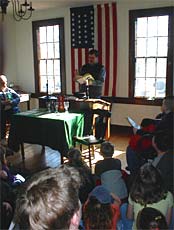|
Students at Washington-Monroe have
profited from a week's worth of storytelling and poetry-writing,
thanks to a visit from author-in-residence Brian "Fox" Ellis of
Peoria. Throughout the week "Fox" worked with students in all grades
at the school, including special needs children, according to
Principal Rebecca Cecil. Ellis told tales about Abraham Lincoln,
shared his own and others' poetry, and encouraged such
reading-related skills as using the library and listening carefully.
"He's neat," judged one third-grader. "He tells stories and they're funny."
Another student said
she likes to write and has written stories before but not poems. Now
she will write poems too, she prophesied.

[Photos by Lynn Spellman]
All the third- and fourth-graders wrote
and delivered poems. Most of the poetry follows a "catalog" format,
using a series of phrases or clauses to describe Lincoln through his
attributes. A third-grader wrote in part:
Black shoes,
Big head,
Sixteenth president,
Really strong.
From another third-grader:
Big, tall black hat;
Taught himself to read. . . .
Was a great lawyer. . .
Saved his friends that were stuck in a
snag,
And freed the poor slaves.

Some of the fourth-grade poems feature
a narrower topic -- Lincoln's assassination or his stovepipe hat,
for example. Apparently one of the stories students learned during
the week is that Lincoln sometimes stuffed his mail into his hat.
The students understand rhyme and some
chose to use it:
You are funny.
That's why your face is on money.
---
As tall as the sky,
But he was still a great guy.
---
He always wore black all the time,
And he was smarter than Albert
Einstein.
---
He was a railsplitter and that's no
joke,
Although when he was a child his
parents were almost broke.
Ellis both encouraged and exemplified
dramatic delivery. "You wrote these poems, so you know them," he
told the students. "So look at us; turn up the drama." And then the
ultimate encouragement: "Pretend Abe Lincoln is in the audience."
In reading Walt Whitman's "O Captain!
My Captain!" to the fourth-graders Ellis demonstrated how to turn up
the drama, holding eye contact, speaking forcefully, enunciating
carefully, varying pitch and speed, using gestures and facial
expressions to reinforce meaning. Prior to the reading he helped
students work out the analogy that if Lincoln is Whitman's captain,
the ship must be the United States.
[to top of second column in
this article]
|

"Isn't he a fabulous speaker!"
exclaimed Shirley Bartelmay, leader of volunteers at Postville
Courthouse State Historic Site. "He has lots of charisma to him."
Besides reading poems, Ellis told
stories about Abraham Lincoln. One tale involved Lincoln's comparing
a heckler to a riverboat steam organ so large that the engine
stopped running when the organ was played. The same applies to the
heckler, said Lincoln: "When he opens his mouth, his brain stops
running." After telling the story and getting his laugh, Ellis let
the students know they could find the information in the
Congressional Record.
In college Ellis majored in education
with an emphasis on storytelling in the classroom. He has put his
training and love of learning to use as a teacher, counselor and
mentor in settings including day-care centers, summer camps and
public and parochial schools. Ecology is a special interest, and he
has acted as "riverlorian" for the Spirit of Peoria paddle-wheel
boat.
"We are all storytellers," Ellis says
on his website
www.foxtalesint.com. "When we come home from a rough or good day
and tell our family about our experience, we are enacting the
ancient art of the story weaver. It is how we wrap our lives and
bind them with others."
At a Washington-Monroe parents' meeting
Thursday night Ellis talked about basic storytelling and sharing the
day's events with children. He asked parents to encourage their
youngsters to be readers and writers, not just TV watchers and video
game players.

Ellis has published four books, many
magazine articles and four cassettes, with another to come out soon.
He is a member of the National Storytelling Association and has
appeared at conferences and storytelling festivals in the United
States and abroad. He presents about 15 storyteller-in-residence
programs a year.
The Washington-Monroe program was
funded by an Illinois Reading Council grant. Third-grade teachers
Gail Zimmer and Deb Turner, fourth-grade teachers Bev Wunderlin and
Leslie Singleton, and Title 1 teacher Mary Clark wrote the grant
application. Ellis presented a similar program at the school last
year.
He says the goal of his business, Fox
Tales International, is "to use storytelling to educate and inspire
listeners towards a deeper appreciation of their selves, their
family and friends, their heritage, and their relationship to the
earth." The quotation appears on his website.
Students'
understanding of their Abraham Lincoln heritage comes out in the
lines of their poems: "He was a great speller, teller of tall
tales." "He gave the town its name." "Abe was a great defender of
his nation."
[Lynn
Spellman]
|
|
According to a June 18, 2002, press
release from the
National Academies' Transportation Research Board, about 800
school-age children are killed every year in motor vehicle crashes
during normal school travel hours -- weekday mornings and afternoons
during school months. This accounts for about 14 percent of the
5,600 child deaths that occur on the nation's roadways. Of these 800
deaths, only about 2 percent are related to school buses, while 74
percent occur in private passenger vehicles and 22 percent are the
result of pedestrian or bicycle accidents. More than half of all
deaths of children between ages 5 and 18 occur during normal school
travel hours when a teen-ager is driving.
"Some parents look forward to their
teen acting as chauffeur for younger brothers and sisters, but we
are concerned that teen drivers are not be ready for the job," says
Gary Direnfeld, executive director of the I Promise Program, a teen
safe-driving initiative.
Direnfeld conducted an e-mail survey of
passenger safety experts, asking their opinion on teens chauffeuring
younger children. Their responses provided for this advice:
1. Don't do it. Do not rely on teen
drivers to transport younger children. Young children often do not
value the authority of a teen driver and may be more prone to acting
up and distracting the driver.

[to top of second column in
this article] |

2. If you must rely on teen drivers to
transport younger children, have the teens learn from a qualified
child passenger safety technician how to install infant carriers,
car and booster seats. Contact your local police service or hospital
to locate an expert in your area.
3. Have your infant carrier, car and
booster seat inspected to assure it meets all current safety
standards.
4. Parents, teen drivers and all other
passengers must wear their own seat belt at all times, allowing only
as many passengers as functional seat belts.
Direnfeld reminds parents that safe
driving starts with them. He says that kids learn to drive long
before they get behind the wheel of a car themselves by watching
their parents. He encourages all parents of teen drivers to enter
into a mutual safe-driving pact, suggesting programs like his I
Promise Program, to help them do so.
Parents interested in reading his child
passenger report can view it at
www.ipromiseprogram.com.
For local
events,
click here to read "Reduce the risk of injuries while
traveling."
[Gary
Direnfeld, I Promise Program Inc.] |